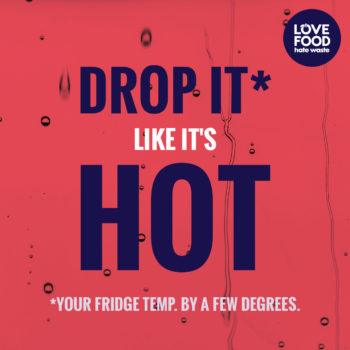Do we really know what happens to food once it disappears into our rubbish bins? When food rots, it emits the greenhouse gas methane. Wasting food is not only a waste of money, but has harmful effects on the environment and climate change.

Love Food Hate Waste (LFHW) is a campaign group from the not-for-profit organisation WRAP, which helps people waste less food, and their campaigns have a huge impact on students at university. Research from Love Food Hate Waste shows that the move to university, although exciting, is also a catalyst for bad food wasting habits. To eliminate these harmful habits, Love Food Hate Waste has designed a new campaign ‘Spoiled Rotten’ to not only raise awareness of the environmental effects of food waste, but also educate students on how to save money.
Their research shows that across the whole of the University of Lincoln student population, there’s a potential to save up to £3.2million! Following their simple top tips can help you save an average of £230 each year.
Tip 1: ‘Get storage savvy’
Love Food Hate Waste has created a useful A-Z storage guide which looks at easy and essential ways to store food and keep your food fresher for longer. Their tool provides a list of food items from apples to zucchinis, which tells you whether your food should be placed in the cupboard, fridge or if it can be frozen. A few examples they include are:
- Potatoes – should be placed in a cool, dark place, not the fridge.
- Eggs – these belong in their original box and in the fridge. Did you know you can freeze them if you’re worried about not using them in time? Separate the whites and yolks and pop them in a labelled container.
- Tomatoes – these can be stored in the fridge to make them last longer.
Tip 2: ‘Chill the fridge out’
Did you know your fridge temperature can have an impact on the planet?
Love Food Hate Waste research shows that the average UK fridge temperature is too hot for most foods, causing food to be ruined and go off quicker. So rather than having the fridge at 7°C, changing the temperature to 0–5°C can keep food fresher for longer and last up to three extra days. Whether you’re in halls or sharing a house, this is an easy way to have a positive impact on the planet (and your bank account!)
An even bigger bonus! If you’re unsure about checking the temperature, Love Food Hate Waste has designed a thermometer tool which helps you work it out.
Tip 3: ‘Be a freezer hero!’
Freezers are the saviours for us students, and all students know the daily struggle fighting for freezer space! Love Food Hate Waste explain how to make the most of your freezer and how it’s useful to prevent wasting food.
A few tips they give on why using the freezer is a useful tool include:
- Freezing the food right up to the use-by date: don’t worry if you’re spontaneous with your meal planning, you can save the food for later in the freezer, then defrost it in the fridge when you’re ready.
- Be portion smart with what you freeze: if you have some fruit about to go off, chop it up and freeze it in chunks! An ice-cube tray is your friend here – freeze chunks separately in the different sections, then when they’re good and chilled pop them all in an airtight container or bag.
Visit the ‘Be a freezer hero!‘ section on their website for more valuable freezer facts.
These simple tips are essential for every student, new or old, and are methods which you can rely on throughout the rest of your journey into adulthood. By following these tips, not only are you saving yourself money, but you’re contributing towards a positive change by protecting the planet too.
To find out more information and advice visit the Love Food Hate Waste website and get involved by sharing the hashtag #SpoiledRotten on social media.
Disclaimer: All figures, research and top tips belong to Love Food Hate Waste.


This is such a useful article, I cant believe £3.2million could be saved! Love Food Hate Waste sounds like a great movement